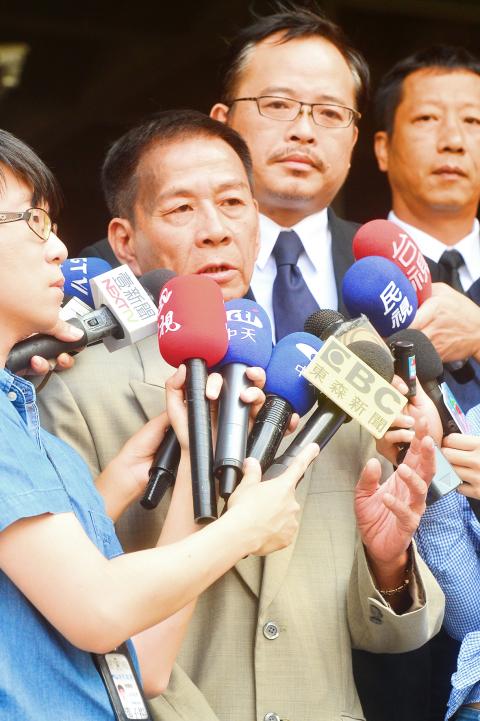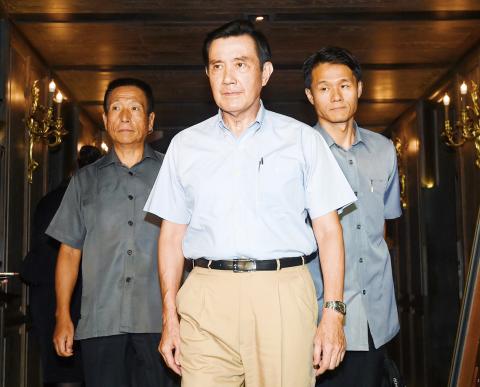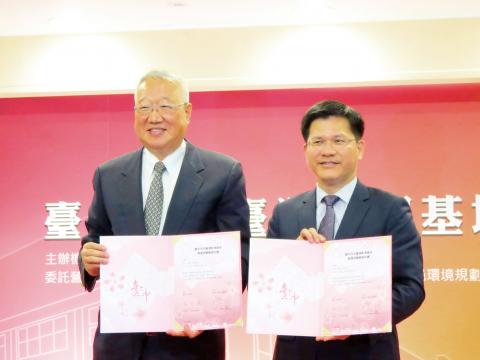Weng Ping-yao (翁炳堯) yesterday said he was instructed by former president Ma Ying-jeou (馬英九) and Cheng Uei Precision Industry Co (CUPI, 正崴) chairman Gou Tai-chiang (郭台強) to kill then-Chinese Nationalist Party (KMT) legislator Alex Tsai (蔡正元) amid a power struggle a decade ago as groups fought for control of the party’s assets.
Weng — who was convicted of firing a gun outside Tsai’s office in Taipei’s Nangang District (南港) on July 28, 2007 — said that KMT officials promised him NT$320 million (US$10.56 million at the current exchange rate) to kill the lawmaker.
He implicated Ma and Gou — who is the younger brother of Hon Hai Precision Industry Co (鴻海精密) chairman Terry Gou (郭台銘); — as well as Lor Yu-chen (羅玉珍), the wife of Gou Tai-chiang; former Central Motion Picture Corp (CMPC, 中影) vice president Chuang Wan-chun (莊婉均); and KMT stalwart Lee Chuan-chiao (李全教).

Photo: Wang Yi-sung, Taipei Times
Accompanied by attorney Chou Wu-jung (周武榮), Weng went to the Taipei District Prosecutors’ Office, saying he wanted to confess to perjury and to ask prosecutors to reopen the investigation of the shooting.
Weng said he has evidence regarding “the plot to bump off Alex Tsai.”
After telling reporters that he would file a lawsuit against “the masterminds of the plot,” Weng entered the prosecutors’ office.

Photo: Liao Chen-huei, Taipei Times
He was released later in the day, with instructions not to leave his residence.
Weng told reporters that he was just “a hired gun, a small potato” in the case and wanted the truth to come out.
The KMT at the time of the shooting was electing members to its Central Standing Committee and other executive positions.

Photo: Su Chin-feng, Taipei Times
There was an intense power struggle over party assets, with the sale of CMPC and other KMT-controlled media companies at the center of a clash between Ma, who was president and KMT chairman at the time, and Tsai, who was the chairman of CMPC at the time, Weng said.
“Tsai refused to resign as CMPC chairman, so Ma struck a deal with Gou Tai-chiang, Lor and Chuang according to which those three would take control of CMPC,” Weng said.
“I was instructed to bump off Tsai,” he said. “It was reasoned that if Tsai was killed, then Gou Tai-chiang would become CMPC chairman.”
Weng said that Lee, who at the time was speaker of the Tainan County Council, brokered the deal to hire him to carry out the assassination.
Weng has a checkered past as a gang member in Tainan and has managed companies in Vietnam.
“I was promised a payment of NT$320 million if I killed Tsai,” he said. “That amount was agreed upon, as it was 10 percent of CMPC’s assessed value of NT$3.2 billion.”
He said the deal broke down when he was asked to also kill Wu Chien-pao (吳健保), a leading KMT figure in Tainan, but was convicted for his involvement in an underground baseball gambling syndicate.
With the deal breaking down, Weng only fired shots at Tsai’s office, he said.
He said he was cheated out of money, only receiving NT$20 million.
“During the trial, I gave false accounts and mislead prosecutors to protect Ma, Gou Tai-chiang and others, but now I want to clear up the facts of the case and let the public know the real masterminds behind the plot,” Weng said.
Ma’s office spokeswoman Hsu Chiao-hsin (徐巧芯) said there is no factual basis and no evidence to Weng’s allegations, adding that Ma had nothing to do with the shooting incident at Tsai’s office.
“It is absurd to the extreme that Ma should be a defendant in this case,” Hsu said. “Ma was not involved, but some people just want to stir up trouble.”

INVESTIGATION: The case is the latest instance of a DPP figure being implicated in an espionage network accused of allegedly leaking information to Chinese intelligence Democratic Progressive Party (DPP) member Ho Jen-chieh (何仁傑) was detained and held incommunicado yesterday on suspicion of spying for China during his tenure as assistant to then-minister of foreign affairs Joseph Wu (吳釗燮). The Taipei District Prosecutors’ Office said Ho was implicated during its investigation into alleged spying activities by former Presidential Office consultant Wu Shang-yu (吳尚雨). Prosecutors said there is reason to believe Ho breached the National Security Act (國家安全法) by leaking classified Ministry of Foreign Affairs information to Chinese intelligence. Following interrogation, prosecutors petitioned the Taipei District Court to detain Ho, citing concerns over potential collusion or tampering of evidence. The

TRADE: The premier pledged safeguards on ‘Made in Taiwan’ labeling, anti-dumping measures and stricter export controls to strengthen its position in trade talks Products labeled “made in Taiwan” must be genuinely made in Taiwan, Premier Cho Jung-tai (卓榮泰) said yesterday, vowing to enforce strict safeguards against “origin laundering” and initiate anti-dumping investigations to prevent China dumping its products in Taiwan. Cho made the remarks in a discussion session with representatives from industries in Kaohsiung. In response to the US government’s recent announcement of “reciprocal” tariffs on its trading partners, President William Lai (賴清德) and Cho last week began a series of consultations with industry leaders nationwide to gather feedback and address concerns. Taiwanese and US officials held a videoconference on Friday evening to discuss the

NEGOTIATIONS: The US response to the countermeasures and plans Taiwan presented has been positive, including boosting procurement and investment, the president said Taiwan is included in the first group for trade negotiations with the US, President William Lai (賴清德) said yesterday, as he seeks to shield Taiwanese exporters from a 32 percent tariff. In Washington, US Trade Representative Jamieson Greer said in an interview on Fox News on Thursday that he would speak to his Taiwanese and Israeli counterparts yesterday about tariffs after holding a long discussion with the Vietnamese earlier. US President Donald Trump on Wednesday postponed punishing levies on multiple trade partners, including Taiwan, for three months after trillions of US dollars were wiped off global markets. He has maintained a 10 percent

PERSONAL DATA: The implicated KMT members allegedly compiled their petitions by copying names from party lists without the consent of the people concerned Judicial authorities searched six locations yesterday and questioned six people, including one elderly Chinese Nationalist Party (KMT) member and five KMT Youth League associates, about alleged signature forgery and fraud relating to their recall efforts against two Democratic Progressive Party (DPP) legislators. After launching a probe into alleged signature forgery and related fraud in the KMT’s recall effort, prosecutors received a number of complaints, including about one petition that had 1,748 signatures of voters whose family members said they had already passed away, and also voters who said they did not approve the use of their name, Taipei Deputy Chief Prosecutor